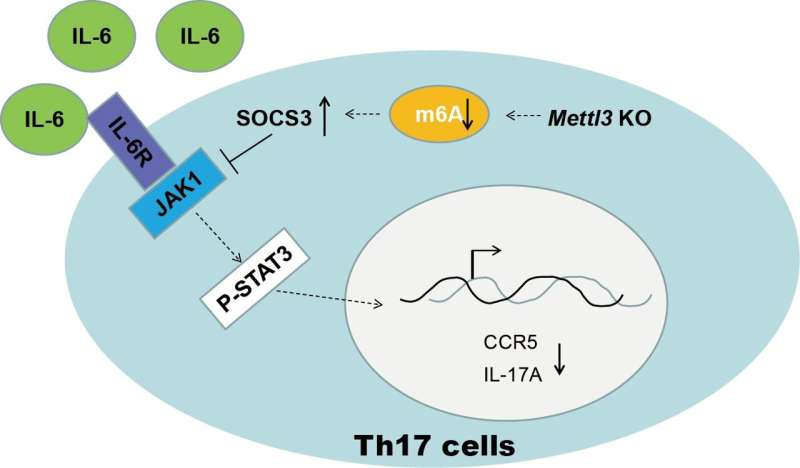This article has been reviewed according to Science X's editorial process and policies. Editors have highlighted the following attributes while ensuring the content's credibility:
fact-checked
peer-reviewed publication
trusted source
proofread
m6A mRNA modification potentiates Th17 functions to inflame autoimmunity

N6-methyladenosine (m6A) is the most extensive studied RNA modification across various species, and the important effect of m6A modification in immune systems has been revealed in distinct contexts, including mRNA metabolism, cell differentiation, proliferation and response to stimulation.
Previous studies from the Hua-Bing Li group demonstrated that m6A methyltransferase METTL3 control T cells homeostasis and sustain the suppressive function of regulatory T cells (Tregs). However, the role of m6A methyltransferase in other subtype of T cells remains unknown.
T helper cells 17 (Th17) play a pivotal role in host defense and autoimmunity. In this study, the scientists found that the loss of METTL3 in T cells caused serious defect of Th17 cell differentiation, and impeded the development of experimental autoimmune encephalomyelitis (EAE). They generated Mettl3f/fIl17aCre mice and observed that METTL3 deficiency in Th17 cells significantly suppressed the development of EAE and displayed less Th17 cells infiltration into CNS.
m6A modification has been reported to participate in RNA metabolism, predominantly affecting RNA stability. SOCS gene mRNAs have been documented as m6A targets in CD4+ T cells, and deletion of METTL3 led to attenuation of SOCS mRNA decay. In this work, they verified that depletion of METTL3 facilitated SOCS3 RNA stability, then further attenuated IL-17A and CCR5 expression, disrupted Th17 cells differentiation and infiltration, and eventually attenuated the process of EAE.
Collectively, the scientists highlight that m6A modification sustains Th17 cell function, which provides new insights into the regulatory network of Th17 cells, and also implies a potential therapeutic target for Th17 cell mediated autoimmune disease.
The work is published in the journal Science China Life Sciences.
More information: Xuefei Wang et al, m6A mRNA modification potentiates Th17 functions to inflame autoimmunity, Science China Life Sciences (2023). DOI: 10.1007/s11427-022-2323-4



















